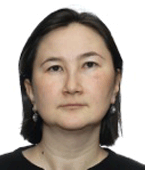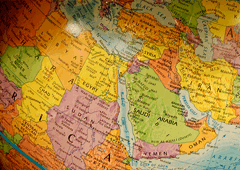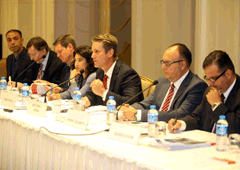
|
|
Fall 2014 Vol.13 No.3

|
|
|
D. Nigâr Göksel
“This issue of TPQ comes at a time when the relationship of the West with Russia is at its most difficult since the Cold War, and a new cold war is said to be in the making in the Middle East. Turkey is between the two hotspots where this geopolitical upheaval is playing out most dramatically: Crimea and Syria.”
“Twenty-five years after the fall of the Berlin Wall and the optimism it engendered, Euro-Atlantic resolve is being severely tested in the East. In the Levant, four years after the so-called Arab Spring began (creating its own share of optimism), ethnic, sectarian, and tribal divisions are challenging the Sykes-Picot borders and the regional order. The points of contention are not only geostrategic but also normative – contestation between democracy and tyranny, between liberal democracy and managed democracy, between secularism and sectarianism.”

|

|
|
|
Thrasyvoulos T. Stamatopoulos
“At the recent NATO Summit in Wales allied leaders (…) adopted a Readiness Action Plan (RAP), which will reinforce NATO’s ability to address current and future threats from wherever they may arise, including the challenges posed by Russian actions. This is the biggest reinforcement of Collective Defense since the end of the Cold War.”
“NATO’s objective remains to encourage Russia to choose a path of cooperation and responsible behavior; to be a country that works within the international community to solve common problems. (…) But this will not take place to the detriment of NATO’s fundamental principles, upon which Euro-Atlantic security lies.”
“When the risk that Turkey would come under missile attack due to the conflict in Syria, the Alliance deployed Patriot missile batteries to defend Turkey against a possible attack, but also to send a clear political signal that all Allies stood with Turkey.”

|

|
|
|
Murat Özçelik
“One may say that Turkish foreign policy in the region has been on a downward slide since the AKP government gradually dispensed with secular principles.”
“The attacks on Kobani by ISIL – and the AKP government’s position on Kobani – were a major turning point in the course of events in the region. The Kurdish citizens of Turkey were extremely upset by the hands-off policy of their government, and, in turn, by the abandonment of the Kobani Kurds’ in their struggle against ISIL.”
“International efforts are underway to stop the carnage of ISIL. Turkey should give every support to this coalition short of sending ground troops into Syria or Iraq. Turkish soldiers, especially after AKP’s attempts to implement a neo-Ottomanist policy, would not be welcome in the region.”

|

|
|
|
Andrei Sannikov
“The EU apparently placed its stakes on authoritarian and dictatorial regimes in its neighborhood in the bizarre hope of achieving democratic improvements ‘from above.’ The Association Agreements, which stressed the shared values of democracy in most cases, were signed with the autocratic rulers in EU’s southern and eastern neighborhoods.”
“Belarus, under the 20-year rule of Aleksandr Lukashenko, is a critical test for the EU’s abilities. (…) The Lukashenko regime actually created the model of neo-totalitarianism – that was closely watched, used as a test ground, and copied by Moscow – which has now reached new heights with Kremlin’s war in Ukraine.”
“‘Europe Whole and Free’ is still a worthy goal but it requires sacrifices from the EU, ones that are nothing compared to the huge sacrifices people in Ukraine, Belarus, and other neighboring countries make by risking their lives for the values Europe has to support by definition.”

|

|
|
|
David Shahnazaryan
“The basis for preferring the ‘historical’ component in the Armenia-Turkey relationship to the political one was laid down after 1998, and made resolution of historical issues conditional on resolution of political issues.”
“Both the international peace brokers and Armenia’s authorities tried to separate the Nagorno-Karabakh conflict issue from the Armenia-Turkey normalization process, while for the officials in Ankara they were and are indivisible issues. From the very onset Turkey did not plan to implement the Zurich Protocols unless there was progress in the Nagorno-Karabakh peace process.”
“The normalization of Armenia-Turkey relations and the opening of the border have never been in Moscow’s geopolitical interest. There is no doubt that the Nagorno-Karabakh conflict resolution and the opening of the Turkish-Armenian border would make Russia’s position in the broader South Caucasus untenable.”

|

|
|
|
Sergi Kapanadze
“Georgian law enforcers have sometimes gone as far as to detain the Turkish vessels in Georgia’s territorial waters and beyond because of illicit trade with Abkhazia. In fact, during the period of 1999-2009 almost 60 vessels were reported to be captured by the Georgian navy in the Black Sea.”
“The Georgian side needs to admit that it cannot exercise a similar degree of control over trade with Abkhazia as it does over the Tbilisi-administered territory. This might be unfortunate, but this is the reality.”

|

|
|
|
Kamil Calus
“Roughly from the middle of 2014 onwards, a distinct change in the policy of Moldovan authorities against Transnistrian separatists can be seen. In recent months, Chisinau initiated a number of criminal cases against Transnistrian politicians.”
“Russia has always supported the idea of the reintegration of Moldova and Transnistria, provided, however, that this process would be conducted on terms dictated by Moscow. From the perspective of the Kremlin, Transnistria was meant to serve as an obstacle to the affiliation of Moldova with the West, understood as integration with the EU – or, less likely, NATO – and the possible reunification with Romania.”

|

|
|
|
Filiz Tutku Aydın
“Since the Crimean Tatars’ return to Crimea, because of the Russian hegemony within the peninsular institutions, they have been excluded in the bureaucracy, courts, police and army, and other government institutions, despite the majority of them being highly educated.”
“Today, human rights violations against Crimean Tatars are a severe problem, and the Crimean Tatars diaspora together with Turkish nationalists protest that Turkey pays less attention to the Crimean Tatars than to other human rights crises, such as those experienced by Palestinians and Syrians.”

|

|
|
|
Roncevert Almond
“Tragedies such as [the downing of Malaysia Airlines Flight 17], economic sanctions, and threats from Moscow to close Russian airspace highlight the critical importance of aviation to international relations.”
“Through institutional and intergovernmental relationships in aviation, and similar technical and economic fields, the West can build-upon its constructive engagement in states along Russia’s periphery. This approach represents a long-term investment in the region that respects Moscow’s vital interests and serves the West’s foreign policy objectives.”

|

|
|
|
Evgeniya Goryushina
“In many respects, the excessively reserved attitude of Ankara towards the Russian-Ukrainian crisis is largely motivated by its loss of confidence in the Middle East. The case of Egypt demonstrates this particularly well. (…) The loss of political capital has subverted the political image of Ankara, and has forced the government to implement a more cogent policy in the Black Sea region.”
“With or without Crimea, it is arguable that Russia would have experienced a tough confrontation with NATO along its own borders in the short-term. In the end, Russia has managed to strengthen its geopolitical position in the Black Sea region via the annexation of Crimea, sacrificing fairly stable relations with Ukraine.”

|

|
|
|
Marios P. Efthymiopoulos
“[Within the context of the Black Sea Region], it is estimated that the creation of new ‘microstates’ is imminent. Microstates are states created out of strategic opportunity, but are not internationally recognized. (…) They may eventually turn out to be a better outcome for all sides, when viewed from all strategic perspectives.”
“A New Ukraine will give rise to membership in Western institutions. A New Ukraine, stable and secure, will be included in the NATO security framework, and, later, in the economic and political organization of the EU.”

|

|
|
|
“Participants of the roundtable highlighted the emergence of three oppositional blocs within the MENA region: a Shiite bloc, including Iran and Hezbollah; a Muslim Brotherhood-friendly bloc, including Turkey and Qatar; and a third status quo supporting bloc, including Saudi Arabia, Egypt, and the UAE.”
“Since the first Roundtable was held in 2010, Turkey’s position has changed dramatically. Roundtable participants highlighted how Turkey’s previous popularity in the Arab world has been replaced with regional isolation. Relations with Egypt, North African states, Gulf Arab countries (apart from Qatar), Israel, and Iran have soured, with Turkey’s support for the Muslim Brotherhood a driver of this trend. Turkey is no longer able to act as mediator of conflicts, which was a position it prized earlier in the 2000s.”

|

|
|
|
“Michael Hoffmann, External Affairs Director of the Trans Adriatic Pipeline (TAP), commented on how the current composition of SGC – South Caucasus Pipeline (SCP-X), Trans Anatolian Pipeline (TANAP), and TAP – makes economic sense. While acknowledging that ‘in a project of 3500 km long and involving seven countries, geopolitics cannot be ignored,’ he asserted, ‘Politics does not necessarily build pipelines; you need customers, you need demand, and you need the ability to pay.’”
“Elnur Soltanov, Chair of the Caspian Center for Energy and Environment (CCEE), argued that for the first time, with SCP-X and TANAP, Azerbaijan and Turkey have emerged as leaders of energy development in the region. This has been possible because Baku has ‘more financial resources than ever,’ and because Baku-Ankara relations have settled on firmer grounds by now.”

|

|
The Premium Corporate Sponsor of this Issue:


|
This Issue's Sponsor:


|
Thanks to our Partners



|
|
|
|






































